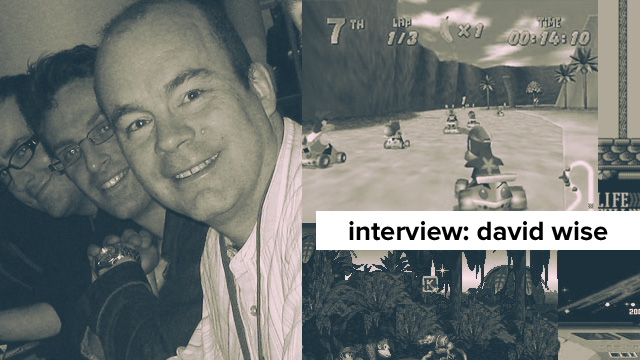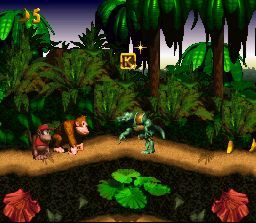
David Wise should need no introduction to even the most casual video game enthusiast. With his soundtrack work in games from Wizards & Warriors to BattleToads to the vaunted Donkey Kong Country 2, Wise has made quite the name for himself in the video game industry, creating background music and sound effects that have inspired imitator after imitator, remix after remix and YouTube comment after YouTube comment. His compositions have been re-imagined even in games outside the originals, whether it’s the arrangements in Super Smash Bros. Brawl or Donkey Kong Country Returns. And while he’s no longer with Rare, whose Donkey Kong Country games rocketed Wise to stardom, Wise shows no signs of slowing down, founding his own studio to work on ventures previously unexplored.
Nintendojo recently got to chat with David Wise about his beginnings as a composer, the nitty-gritty of coding sound and what lies beyond for David Wise Sound Studios. Fire up your iTunes, type in “David Wise” and put on some “Aquatic Ambience” while you read on.
Nintendojo: How did you get into the video game industry?
David Wise: At the time, I was working in a music shop in Leicester demoing keyboards, when two customers came in, Tim and Chris Stamper, founders of Rare. After giving them a demonstration of a Yamaha CSX music computer, hooked up via MIDI to other keyboards, they asked me who wrote the music that was playing. I told them I did, and I got the job right there. Very accidental really.
ND: Do you have any specific musical qualifications?
David: I learnt it all on the job really, totally self-taught. When I was younger I had piano lessons, getting to grade 5, but that was really the only formal training I received.
ND: What are your tools in creating these amazing pieces of work?
David: I have a CME keyboard, though last year I was in America, and purchased an Akai MPK mini with the drum pads. I used that for a couple of weeks and really liked it, so the next one I’m going to purchase will be the 88-note Akai MPK88 (its big brother). Software-wise, I use Native Instruments Komplete 7, Cubase 6, Vienna Ensemble Pro to act as a host and to network with my other computers to host the Vienna libraries, as well as other 32- and 64-bit applications. I use the Spectrasonics Instruments too– absolutely fantastic and easy to program. I’m also running Halion 4 and Halion Sonic amongst a whole host of others. I also use the Sony Oxford range of plugs when mixing, along with Izotope Ozone and Alloy.
 ND: Are there any musicians, bands or genres which inspire you?
ND: Are there any musicians, bands or genres which inspire you?
David: Certainly, there are many sources of inspiration. I was listening to various things on YouTube last night, several Latin musicians, absolutely phenomenal percussionists. I was doing a little percussive programing in Cubase and needed some authentic grooves so used YouTube, and latinpercussion.com, which also has lots of videos. I bookmarked reference points for inspiration and then came back to them whilst inputting the percussion parts. Sometimes on films I might notice a really cool piece of music that fits the scene perfectly, or simply a tune on the radio can have the same effect. Along with many of the traditional composers such as Prokofiev and Wagner.
ND: What was the process for coding sound on the NES and SNES?
David: On the NES it was a 6502 chip using a variation of an 8910 for audio, and I worked with an assembler as I typed data in. The way it worked, I would use HEX numbers (16 numbers, 0-F) writing in one number for the pitch of the note and one for the length. For example “81,08”– where 81 would be a low c on the keyboard, followed by a length of 8 units. We had certain codes and routines which enabled us to do pitch bends, etc. From memory I think there were two variable pulse waves, a triangle wave and a noise channel for creating the sound tracks/FX. There was also a way to play back very crude samples, but we never had the luxury of that much memory.
For the SNES, we could have used MIDI, but we only had eight monophonic channels with a 64k sample memory. If we had used a MIDI program it would have taken processing and extra memory from the 64k that we had for sample memory. Because of this, I continued to use HEX coding, which we imported over from the NES as it is much more efficient– there are no extra layers of coding. If we were using MIDI, there would be a whole lot more data than there is just typing in the bare code.
ND: Did you have to fight your corner sometimes for space on a cartridge?
David: Oh yeah, absolutely, we were putting all those 3D graphics into the games, and if they could have taken memory from the audio, they would have. When we were developing Star Fox Adventures for the GameCube they compromised it totally. The audio could have been a much larger part of the game, so even with all the space on disks it never stops. Anything that can be taken, will be, and used for the graphical side of the game.
ND: At what point were you brought into the development of a game?
David: I’d start writing music almost as soon as a game went into development. Tim Stamper, who was the artistic director at Rare, was very conscious that as soon as you have aspects in there like music, then the development is starting to come together as a full product. If you have a bit of everything at the beginning, it becomes much easier to excite and enthuse the team, rather than doing things sporadically and coming together at the end. Otherwise it is not a cohesive team effort. So to have sound FX and some sort of music in there from the beginning definitely helps with the overall development. It also helps me to see the direction of the game and get a feel as to where it’s heading. The downside to this is you might get a lot of wasted development. There are a lot of compositions that never saw the light of day, and never will. I always found that if people were unsure about the composition I presented, it would be more work to adapt it to suit, than it was to start something new.




 ShareThis
ShareThis







“With his soundtrack work in games from Wizards & Warriors to BattleToads to the vaulted Donkey Kong Country 2…”
I’m sure you meant “vaunted”. Come on, guys. You can do better than this.
Thanks for catching that! We always strive for total accuracy but our minds have been on other things lately. (Xenoblade…)